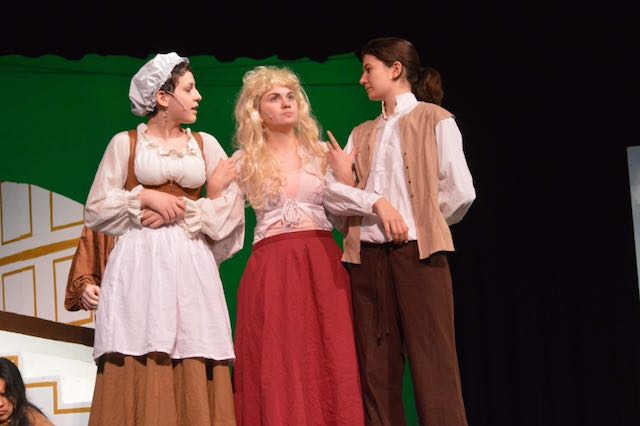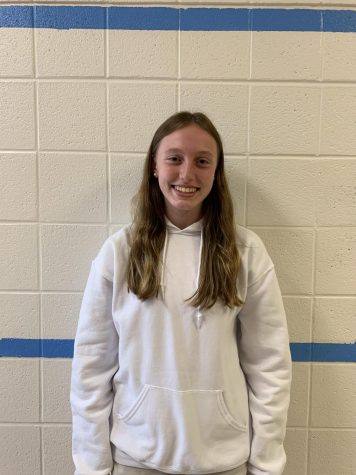“The audience is going to be on a wild ride”: Whitman Drama stages production of “Marie Antoinette”
The play explores Antoinette’s journey of self-discovery and self-reflection, exposing her inner thoughts as she struggles to maintain peace and control amidst family issues and public disapproval.
November 19, 2022
The spotlight shines on Marie Antoinette and a sheep as they sit next to one another in a prison cell. The cell sits atop an elevated platform in the center of the otherwise darkened stage. As the world around Antoinette crumbles, she shares a tirade of disbelief with her last source of company.
After a short pause, Antoinette, portrayed by junior Samantha Sanders, declares: “They were happy to have me when I was a queen. I’m still a fucking queen!”
This weekend, Whitman Drama showed the play “Marie Antoinette,” written by David Adjmi, as part of the program’s female empowerment theme for its shows this year. The play is a satire that illustrates Antoinette’s life from the height of her infamy to her execution, and runs Nov. 17, 18 and 19 at 7:00 p.m.
After marrying King Louis XVI, Antoinette reigned as the last queen of France before the French Revolution. Her status as a foreigner and her flamboyant lifestyle contributed to widespread mistrust, obscene rumors and deep hatred for the Queen who lived lavishly as the French people suffered through tumultuous times.
“This is a woman who’s ruling in a man’s world,” said Whitman Drama Director Tyler Herman. “She’s not ruling; she’s the wife to a ruler. The whole system is set up against her and a lot of the prejudices that she feels in the play and in life were not because of her direct actions, but because she was a foreigner.”
The play explores Antoinette’s journey of self-discovery and self-reflection, exposing her inner thoughts as she struggles to maintain peace and control amidst family issues and public disapproval.
Through their portrayal of Antoinette, the cast hopes to convey that individuals in positions in power who are facing public scrutiny may not deserve the negative attention they receive, Herman said.
Beyond a limited number of whole-cast rehearsals, the first two months consist mainly of individual scene rehearsals that involve a small number of cast members and behind-the-scenes work from technical team members.
Producer Ryan Kulp, a senior, manages logistical aspects of the production, which include ticket sales and publicity throughout the rehearsal process.
“I enjoy doing the behind the scenes work — the work that the audience will never see,” Kulp said. “While the work contributes to a large portion of the production, it is out of the spotlight.”
Assistant Stage Manager, Maeve Brogan, a junior, took blocking notes and completed rehearsal reports while the actors practiced their scenes. She noted technical cues like lighting, sound effects, the position of props and costumes for quick transitions and the elements of the show that tech crews are responsible for.
For this production of “Marie Antoinette,” the tech staff aimed to transport the cast to the grandiose palaces and elegant gardens that royalty enjoyed in late 18th century France through hand-made set designs, props and costumes.
Scenic Designer Kieran Graeff, a senior, said that the set designers wanted to display a sense of royalty with the structures they built for Marie Antoinette. The set is large and focuses on one central platform rather than the multiple small platforms that appeared in his past designs.
“Marie Antoinette” allows the technical team unique latitude for creative expression through the costumes that the cast wears on stage. As the Costume Designer, senior Gabi Murray and her team were responsible for the actors’ appearances on stage. They coordinated the performers’ clothing, makeup and hair — which, for Marie Antoinette, was composed of many different wigs to fit the time period. The crew also hand-designed or purchased each item of clothing onstage.
“This production in particular has a lot of very complex costumes, which is super exciting,” Murray said. “A lot of them are interpretive too, which gives us a ton of freedom. I especially love historical costuming.”
Rather than strictly adhering to the late 18th century style, the costume team used the style as a starting point for the costumes they designed. The department aimed to display Antoinette’s immense wealth and status while remaining within their budget, Murray said.
“As a high school production, our goal is to reference those fashions without exactly recreating them since we don’t exactly have the budget of imperial France,” Murray said.
Costume designers incorporated items of clothing that Antoinette would have actually worn — bodices, wide and flat skirts and many layers of fabric — with several modern twists, like extravagant makeup, knee-length skirts and the use of tulle, Murray said.
Since mid-October, cast members had focused their rehearsals on making scenes faster and more consistent. These rehearsals all led up to the last few weeks before the show: tech weeks.
“The last couple of weeks are taking that acting work and bringing it in with the tech work,” Herman said. “The acting work may have to change to suit the tech and the tech changes to suit the acting and we all bring all of our contributions to it.”
Strong collaboration between the tech crews and the cast is an essential part of ensuring the show runs smoothly, Herman said. During these grueling weeks, the entire cast and crew worked up to seven hours each day to perfect the show before opening night.
Just as the technical crews enjoy demonstrating creativity and leadership skills backstage, student actors appreciate being able to express themselves on stage. They learned the flaws, desires and motives of their characters as well as the language and tone of the dialogue. The cast dissected the script to ensure they understood their character before they choreographed movements and put scenes on stage. Playing their given character is a breakaway from the pressures of their everyday lives, said junior Samantha Sanders who starts as Antoinette.
“[It’s] a way to express myself but also, get all the stress out so you can escape from the reality of your situation and the work you have to do,” Sanders said. “You can just play around and have fun!”
Junior Ashley Scharpf plays Therese De Lomballe, and said that she is especially fond of the tight-knit community the cast members have formed over the course of the production. The 11-member cast worked hard to ensure they deliver scenes effectively on stage during the three months they had to rehearse.
“It can be stressful, but that’s what’s fun about it, because you’re part of something really awesome,” Scharpf said. “It’s worth it.”
All students involved in the show have become a part of a strong community that worked to ensure a smooth performance on opening night.
“While there may be long hours, working with my fellow Production Staff members is what makes this process as a whole the most manageable,” said Technical Director Micah Janger, a senior. “We work together as an amazing team.”
After months of preparation, Herman and the entire cast and crew were ready to illuminate the stage with a humorous, thrilling and impactful tale.
“I think the audience is going to be on a wild ride,” Herman said. “The audience is going to come in one way and leave changed.”
This story was updated at 1:40 p.m. on Nov. 20 to correct a misspelled name.










